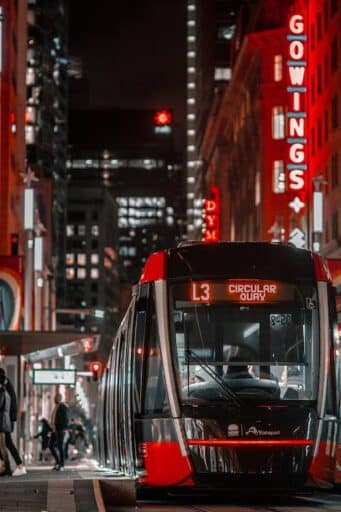When you’re moving to Australia, you’re not simply starting a new chapter in your life; you’re opening up a world of adventure, culture, and the easygoing Aussie way of life.
If you want to invest as an expat or high-net-worth individual, you can email me (advice@adamfayed.com) or use these contact options.
Table of Contents
How to Move to Australia: Visa and Residency
There are many types of visa in Australia to choose from.
Australia offers various work visas for skilled workers, with the potential to apply for permanent residence or citizenship. We’ll highlight some of your options below.
- Granted to those with prior temporary work visas, the Subclass 887 Visa allows permanent residency if you’ve lived and worked in a specific Australian region. Citizenship eligibility is possible after a few years.
- For highly skilled individuals meeting point requirements, Subclass 189 Visa provides indefinite work, study, and living rights in Australia, subject to visa conditions and laws.
- The Subclass 191 Visa offers permanent residency to those who previously held an Australian visa and lived, worked, or studied in a specified regional area. You can apply from within or outside Australia but not from immigration clearance.
- The Subclass 190 Visa (Skilled Nominated Visa) is a permanent work visa that you can obtain through invitation and nomination. To secure nomination, you must be highly skilled and meet the points requirement.
- Subclass 187 Visa (Regional Sponsored Migration Scheme – RSMS) is for skilled nominated workers who have previously lived in Australia under another work visa. Nomination must come from the same sponsor, and the nominated position must be in regional Australia. The Subclass 187 visa offers the flexibility to work, study, and live in Australia indefinitely, with the possibility of applying for citizenship if eligible.
- Subclass 186 Visa (Employer Nomination Scheme) is a permanent work visa given to foreign workers nominated by Australian employers. There are different streams within the 186 visa program, each with its own eligibility criteria, but all require nomination by an eligible sponsor.
- Part of the Global Talent Independent Program, this visa aims to streamline permanent residency for highly skilled individuals. To qualify, you must demonstrate exceptional expertise in your field and showcase how you will benefit Australia economically or socially. This program has limited spots, and recruiting agents are available in various locations.
- The Subclass 124 Visa (Distinguished Talent Visa) is a permanent Australian visa designed for internationally recognized individuals known for their outstanding achievements in fields such as sports, arts, literature, academics, and more. It is granted to applicants outside the country, and it allows the applicant’s family members to reside in Australia indefinitely.
On top of these visas, there are also various types of family visa as well as a Business Talent (Permanent) visa, with the latter specifically for establishing or developing a new or existing business in Australia.
Living in Australia 101
Australia Cost of Living
Living standards vary in Australia. Mid-range restaurants charge 120 Australian dollars (A$) or 76 US dollars for a three-course meal for two. Downtown cafés charge A$4–A$5 for cappuccinos and soft drinks.
A monthly fee of A$79 is assessed for adult fitness club membership, A$25 for weekend tennis court time, and A$20 for a movie ticket.
Australian utilities cost roughly A$327.5 per month for an 85-square-meter flat.
Within the city center, one-bedroom apartments rent for A$2,303 while three-bedroom ones rent for A$3,781. Rents in rural areas typically reach A$1,837 to A$2,734 per month. Apartments in Australia cost A$9,082 to A$11,865 per square meter on average to acquire.
A lone expat can expect to pay under A$2,000 per month excluding rent, while a family with four members can spend over A$6,000. Do take note of these costs when moving to Australia.
Language in Australia
Despite English being Australia’s official language, many families and communities speak different languages. This linguistic diversity helps Australia compete in trade and create cross-cultural relationships, which strengthens international relations.

What are the seasons in Australia?
Australia’s climate exhibits significant variation across its eight states and territories, characterized by four distinct seasons in most regions and a distinct wet and dry season in the tropical north. It’s important to note that Australia’s seasons occur at opposite times to those in the northern hemisphere.
Summer in Australia spans from December to February, with warm and sunny weather. Autumn, from March to May, offers milder temperatures and is marked by falling leaves. Winter, occurring from June to August, brings cooler days and cold nights, often dropping below 0°C. Finally, spring unfolds from September to November, with a return to warmer temperatures and blooming landscapes.
In the southern outback regions of Australia, the climate tends to be dry and sunny throughout the year. During the summer months (December to February/March), daytime temperatures can soar to very hot levels, while evenings remain quite warm. In contrast, the winter months (June to August) feature pleasant daytime temperatures but bring cold nights, often dipping below freezing.
Is Australia safe for expats?
Australia consistently ranks among the safest nations. Violence, homicides, assaults, and muggings are lower than in many other countries. Most places are safe for nighttime solo walking too.
Australia has tight gun control laws because the country values public safety highly. Publicly carrying a firearm or other weapon without proper permissions is illegal and helps maintain a peaceful setting.
A stolen phone or bag is not something that happens frequently in the country, though complaints of theft do come on occasion. Australia’s commitment to public safety and its low crime rates make it a secure and welcome destination for locals and expats alike.
Is healthcare free in Australia?
Citizens and permanent residents who live in Australia have access to a high quality healthcare system at a low cost. Due to taxes covering healthcare costs, medical care is either cheap or free.
Australia’s healthcare system provides general, preventative, and specialist or hospital care for complex disorders. Healthcare can be obtained through either public or private systems or both.
Mainly state and territory governments own and operate public hospitals, community-based services, and allied health organizations. Permanent residents and locals can receive free or low-cost public health care through Medicare, a universal health insurance scheme. They can receive free or subsidized optometry, dentistry, psychiatric, and doctor services under such program.
A percentage of your tax bill goes toward Medicare. A Medicare levy of 1.5% of taxable income is paid by all taxpayers with earnings above a particular level; high-income earners without private health insurance pay a higher rate of 2.5%. All Australians are covered by a comprehensive healthcare system thanks to this funding method.
Best places to live in Australia
- With its beautiful harbor and Opera House, Sydney is a worldwide center with jobs for everyone, from working holiday visas to specialized careers. Sydney’s big expat community and strong public transport make it easy to travel about.
- The cultural center of Australia, Melbourne offers expats many possibilities and attractions. A well-planned and managed city, the city is known for its cultural, culinary, and sporting experiences.
- Brisbane is an expat-friendly Australian city on the rise. The city’s mild temperature lets residents enjoy outdoor activities most of the year. Thanks to the weather, outdoor activities, and low cost of living, life is good here.
- Perth has cultural, culinary, and sporting events without the congestion of Sydney and Melbourne. Weather, outdoor activities, and low cost of living make this a high-quality of life. Numerous expats are the main draw.
- Expats who enjoy wine and gastronomy should reside in Adelaide. The city’s wine regions and gastronomy scene are famous.
- Family-friendly Canberra is Australia’s capital. fantastic schools, a good level of life, and low crime make the city a fantastic place to raise a family.
- Hobart: Tasmania’s capital is great for environment lovers. The city is surrounded by nature and living is easy.
- The Gold Coast is a famous tourist destination for beach-goers. Warm weather, magnificent beaches, and a lively nightlife characterize the city.
- This leisurely lifestyle is ideal for retirees on the Sunshine Coast. The city is warm, has great beaches, and is relaxed.
There are many beautiful places to live your new life in Australia and finding the “best” one really comes down to your own preferences and needs.

Can foreigners buy property in Australia?
Many Australian lenders have stringent qualifying standards, including that house loan applicants be Australian citizens or permanent residents.
The Foreign Investment Review Board (FIRB) must be consulted by any foreign investor planning to purchase real estate in Australia. Purchases of new homes or unoccupied land with the intention of building them by non-residents and foreign investors are restricted. If they decide to buy a pre-existing house, they must make it their permanent residence for at least two years before selling it.
The FIRB assesses an application fee, the amount of which is based upon the property’s value. Apart from these additional requirements, the home buying and home loan application processes for Australia accommodation largely mirror those applicable to local residents.
It is imperative to be aware of the severe consequences associated with violating FIRB regulations. Non-residents or temporary residents who acquire property without FIRB approval may incur fines determined by the number of penalty units corresponding to their breach. Depending on the nature of the breach, individuals could also face potential imprisonment.
Aside from buying real estate for investments, you can also double-check alternative investments like investment funds to see if they’re something worth putting money into.
Jobs in Australia for foreigners
- Education Sector: There is a pressing demand for educators in Australia, particularly in the secondary education sector. If you possess teaching qualifications and experience, you are likely to encounter minimal challenges securing a job in this field. Specialized subject knowledge, such as mathematics or language expertise, is particularly sought after at the moment, giving you a competitive edge in your job applications.
- Customer Service: Proficiency in customer service is consistently valuable but is especially coveted presently. Companies across various industries, from retail to IT, are actively seeking individuals who exhibit patience and excellent communication skills. If you possess these qualities, you can anticipate a wealth of job opportunities, especially if you have prior customer service experience.
- Project Management: Competent project managers are indispensable in virtually all sectors in Australia, essential for ensuring smooth business operations and timely, budget-conscious project completion. Apart from industry-specific expertise, project managers must excel in soft skills such as effective communication, organization, and team motivation. If you possess these competencies, you are well-positioned to secure one of the numerous project manager positions currently available.
- Nursing: The demand for healthcare-related skills, including nursing, remains consistently high. Australia has a significant need for qualified and experienced nurses capable of providing comprehensive patient care. If you are a trained nurse, you are likely to encounter minimal obstacles in your job search, particularly in light of the aftermath of COVID-19.
- Mental Health Assistance: Australia understands the need of caring for one’s mental health in addition to their physical health. Psychologists and other mental health specialists are in high demand as people try to overcome the emotional toll that contracting COVID-19 has taken on them. Numerous opportunities exist for people with backgrounds in mental health counseling, crisis management, and other related fields.
- Sales: Numerous Australian businesses are actively seeking skilled, seasoned, and diligent sales professionals. If you excel in communication and have the ability to effectively promote products or services to prospective customers, you will find abundant opportunities to apply and enhance your skill set during your job search in Australia.
How is Australia transport?
Australia provides a wide array of transportation alternatives that effectively accommodate diverse travel requirements. A comprehensive understanding of the functioning of the transportation system is crucial for expats moving to Australia.
The public transportation network in the country has four main forms of transportation, namely trains, buses, ferries, and light rail often known as trams. Certain cities may have different options available.
Upon arrival in Australia, individuals may have the option to acquire a transportation card at either the Domestic or International airport rail stations, depending on their intended city of destination. In addition, these cards are frequently accessible through other channels such as vending machines, convenience stores (e.g., 7-Eleven), newsagents, bus and train stations, ferry terminals, pharmacies, and supermarkets.
Australia prioritizes the preservation and upkeep of its public transportation infrastructure, with a particular focus on providing passengers with secure and sanitary services. These systems are subjected to strict regulations in order to maintain and ensure high levels of facility maintenance and safety.
In contrast to public transportation in some other nations, majority of vehicles in Australia’s public fleet are contemporary with air conditioning. All stations and terminals are kept in top condition and under constant video supervision.
Passengers can also feel safer knowing that uniformed and unmarked security officers frequently monitor these stations and terminals and may even ride along on the cars themselves. Generally speaking, the public transportation system in Australia is highly regarded for its dependability, efficiency, and emphasis on passenger safety.

Driving in Australia for foreigners
Most Australian states and territories allow expat drivers to use their foreign licenses as long as they are valid. Always carry your foreign license when driving in Australia. An international driving permit or certified English translation is required if your driver’s license is not in English.
However, Northern Territory legislation differs. A Northern Territory driver’s license is required after three months of residency. For those who want to drive in the area after three months, you can apply for a local license exemption. The Northern Territory is the only Australian state and territory with this statute.
Is education free in Australia?
Public schools in Australia are free for citizens and permanent residents, but Catholic and independent schools charge tuition. All Australian schools must follow their state or territory’s curriculum frameworks.
Studying in Australia guarantees high-quality education, global recognition, and great job chances. International students favor Australian institutions for their research-intensive programs and innovative teaching methods.
Australian universities consistently rank high in global assessments like the QS World University and Times Higher Education Rankings due to academic excellence, a vibrant campus climate, and highly trained teachers.
Australian cities such as Sydney, Melbourne, Adelaide, Perth, and Brisbane routinely rank high among international students. Australian regulations preserve and maintain the quality of education for international students, regardless of field or duration.
The country’s education system emphasizes active learning and skill development. Australia’s early childhood education promotes teamwork, strong relationships, creative expression, and the development of fundamental abilities including communication, reading, writing, and math.
Banking in Australia for expats
While there are only a handful of truly dominant domestic banks in Australia, the country is home to well over a hundred financial organizations overall.
Credit and debit card purchases are widely accepted in Australia thanks to the widespread availability of EFTPOS devices. These terminals are widely available at retail establishments and service stations where consumers frequently make transactions. When making a purchase at an EFTPOS terminal, you’ll be asked to select the account from which you’d like to deduct the funds, just like at an ATM.
Depending on the terminal’s configuration, you may be able to use the same card to pay from multiple accounts. The convenience of electronic transactions in Australia is increased by this adaptability.
You should check with various banks if you’re interested in specific services, such as priority and private banking, and offshore banking, among others.
Bringing a dog when moving to Australia – is it allowed?
Australia is a wonderful country for pets; it has many pet-friendly public spaces as well as a plethora of pet-friendly activities to enjoy with your furry friend. However, the country has strict biosecurity regulations that protect the local flora and fauna from exotic and introduced diseases. To safeguard the local wildlife, Australia’s pet import regulations are complex and very stringently enforced.
- Import Permit: To bring your dog into Australia, you must obtain an import permit. This involves submitting an application along with supporting documentation, including rabies vaccination certificates, veterinary health certificates, and other relevant paperwork.
- Veterinary Requirements: Your pet dog must meet specific veterinary requirements before flying to Australia. This includes two treatments against internal parasites, with the second treatment administered within five days before export. Additionally, dogs must undergo treatment for ticks and fleas.
- Waiting Period: A waiting period of six months is mandatory after the blood sample is received at the laboratory for the Rabies Neutralizing Antibody Titre Test (RNATT). Only after 180 days from the arrival of the blood sample at the laboratory can the dog or cat be eligible for export to Australia.
- Microchip: Your dog must be microchipped with an ISO-compliant microchip.
- Approved Countries: If your pet needs to transit through another country, it’s crucial to ensure that the transiting country is also an approved country according to Australian regulations.
- Professional Assistance: Importing a pet into Australia can be a complex process due to stringent biosecurity and import regulations. Errors in documentation or failure to meet veterinary requirements could lead to extended quarantine periods or even the rejection of your pet’s entry into Australia. Therefore, it is advisable to seek professional assistance from a pet travel specialist to navigate this process smoothly and ensure your pet’s safe arrival in Australia.
Pained by financial indecision? Want to invest with Adam?

Adam is an internationally recognised author on financial matters, with over 760.2 million answer views on Quora.com, a widely sold book on Amazon, and a contributor on Forbes.



